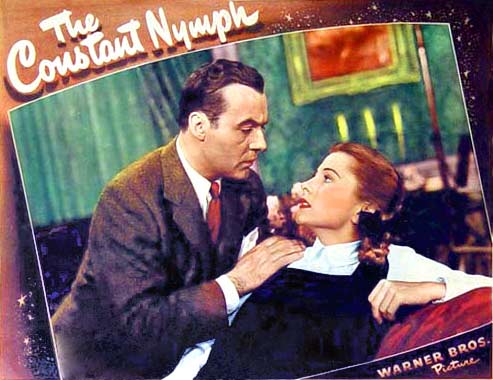The Constant Nymph (Edmund Goulding, 1943): USA
Reviewed by Byron Potau. Viewed at Mann’s Chinese Theatre as part of the 2011 TCM Classic Film Festival.

It was her soft, timid manner coupled with her beauty in films like Suspicion, Rebecca, and The Women that first endeared me to Joan Fontaine. She was an undeniable talent, yet, compared with other Hollywood starlets her output of quality films seemed noticeably smaller so it was of considerable frustration that The Constant Nymph remained elusive for so many years. It was as though the film didn’t exist anywhere even though it was one of Fontaine’s three Oscar nominated performances of her career. It was not until the film’s screening at this year’s TCM Classic Film Festival that I learned of the legal entanglements concerning the film’s rights that have kept it out of circulation and unseen all of these years.
Lewis Dodd (Charles Boyer) is a struggling composer, but one area he does not struggle is in sparking the attention of women. However, he shows no interest in any of them to the delight of Tessa (Joan Fontaine), the teenage daughter of Lewis’s friend and fellow musician, who harbors a secret crush on him and whom Lewis dotes on. When Tessa’s father dies this brings Lewis in contact with Tessa’s older cousin Florence (Alexis Smith) who immediately attracts Lewis. Soon after they are married and Tessa is sent to a boarding school with her sister, but when she leaves school to be with Lewis again to help him with his new composition this causes new found feelings in Lewis as well as jealousy in Florence.
What was highly anticipated turned out to be a rather average, sentimental Hollywood romance picture. Boyer had played similar romantic lead roles in other films such as Mayerling, Conquest, and Love Affair, and looks comfortable here, but does not excel beyond that.
Fontaine has the bigger challenge of trying to effectively portray a teenager (she was 26 at the time). Despite skipping around a bit too much her sweetness and youthful beauty shine through and contribute to an effective performance.
However, Fontaine’s performance is not enough to elevate the film past average melodrama. The script offers little more than the doomed love triangle plot and a heart condition for Tessa thrown in to make sure we sympathize with her. Nor does it give us much more in the way of comic relief than having Charles Coburn’s character, also named Charles, mispronounce the servant Roberto’s name, instead calling him Robert O.
A special mention needs to go out to TCM for freeing the film from its limbo so that it can be seen again. It was a true pleasure to finally have the chance to view it after so many years of wondering if I would ever see it. While not the best work of any of the major players involved it is worth having around as another example of Fontaine’s talent and an interesting precursor to a similar role she would play five years later in Letter From an Unknown Woman.
About this entry
You’re currently reading “The Constant Nymph (Edmund Goulding, 1943): USA,” an entry on Student Film Reviews
- Published:
- 05.25.11 / 1am
- Category:
- Films, TCM Film Festival 2011
1 Comment
Jump to comment form | comments rss [?] | trackback uri [?]